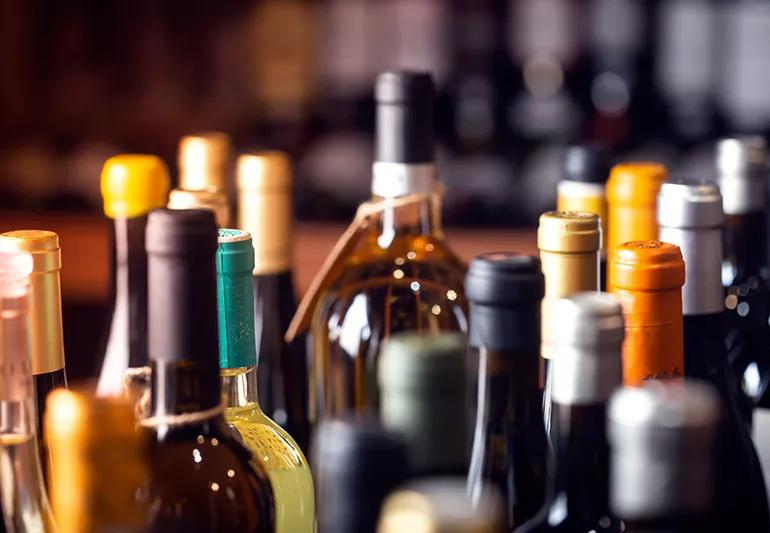A kidney specialist breaks down this problematic relationship

Image content: This image is available to view online.
View image online (https://assets.clevelandclinic.org/transform/921962db-c4b9-4803-897e-8584b2dadb4d/AlcoholKidneyDisease-1144881204-770x533-1_jpg)
variety of wine bottles on table
After a night of one too many cocktails, you wake up dehydrated with a stitch in your side. Is that pang your kidneys crying “uncle?”
Advertisement
Cleveland Clinic is a non-profit academic medical center. Advertising on our site helps support our mission. We do not endorse non-Cleveland Clinic products or services. Policy
Drinking alcohol to excess is linked to several health problems, including liver disease and an increased risk of some cancers (not to mention risks from drunk driving or accidental injuries while intoxicated).
But the relationship between alcohol and your kidneys is a bit more nuanced. Kidney specialist Shane A. Bobart, MD, FASN, breaks down this troublesome pairing.
Your kidneys have an important role to fill. They filter waste from your blood, regulate the balance of water and minerals in your body and produce hormones.
When you drink heavily, your kidneys have to work harder to filter out the alcohol. And in rare cases, binge drinking — five or more drinks at a time — can cause a sudden drop in kidney function called acute kidney injury. This serious condition occurs when toxins from alcohol build up in your blood so fast your kidneys can’t maintain the proper fluid balance. Though it’s reversible with treatment, it can increase the risk of developing chronic kidney disease.
Regular, heavy alcohol use can also be harmful to your kidneys over time. According to the National Kidney Foundation, regular heavy drinking can double the risk of chronic kidney disease. The risk is even higher in people who drink heavily and also smoke.
Advertisement
Heavy drinking also has an indirect effect on kidney health. “The body is a big domino set,” says Dr. Bobart. “If you have one part of your body that’s not in balance, it can cause problems in many other parts of the body.”
Drinking heavily can increase the risk of high blood pressure and Type 2 diabetes, for example. Both of those conditions are the most common causes of chronic kidney disease in the United States.
Chronic alcohol use is also a major cause of liver disease. When your liver isn’t functioning well, it can impair blood flow to your kidneys. “Liver disease can have significant impacts on the kidneys,” says Dr. Bobart.
What about the kidney pain some people claim to feel after a night of drinking? According to Dr. Bobart, there’s no research to suggest a link between alcohol and kidney pain. But alcohol acts as a diuretic and can leave you dehydrated.
Similarly, there’s minimal evidence to suggest that alcohol increases the risk of kidney stones or kidney infections. “We do know that people who don’t drink enough fluids have a greater chance of developing kidney stones.” So, people who drink heavily and are often dehydrated may be at greater risk — though the science of alcohol’s role in kidney stones is still unclear, he adds.
What is clear is that heavy drinking takes a toll on your organs, kidneys included. Many people drink more than they realize. In the U.S., heavy drinking is defined as:
“I urge anyone who has any trouble with alcohol to seek medical help,” says Dr. Bobart. “Doing so is nothing to be ashamed of. We have a lot of avenues to help people, and there are resources out there to get people the help they need.”
Advertisement

Delivered every Tuesday!
Sign up for our Health Essentials emails for expert guidance on nutrition, fitness, sleep, skin care and more.
Learn more about our editorial process.
Advertisement
Take action to prevent common diseases that harm kidneys
Even one drink can have an impact on your cognitive function leading to slurred speech, blurred vision and impaired memory
Even one drink can have an impact on your cognitive function leading to slurred speech, blurred vision and impaired memory
Alcohol affects your whole body, from your liver and immune system to your brain and mental health
Expect some new prescriptions, as well as recommendations to avoid some medications
It can help determine a best treatment path
Modifying your salt intake can affect your health and longevity
What's good for one is good for the other
Type 2 diabetes isn’t inevitable with these dietary changes
Applying a hot or cold compress can help with pain
Pump up your iron intake with foods like tuna, tofu and turkey